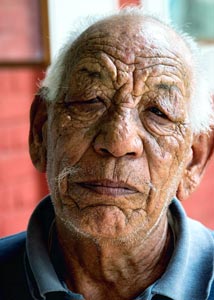Name: Paljor
(Alias: No)
Gender: Male
Interview Age: 81
Date of Birth: 1926
Birthplace: Changdong, Utsang, Tibet
Year Left Tibet: 1959
Profession: Servant
Monk/Nun: No
Political Prisoner: No

Interview No.: 4
Date: 2007-07-02
Language: Tibetan
Location: Lugsung Samdupling Settlement, Bylakuppe, Karnataka, India
Categories: Culture and History
Keywords: childhood memories, Chinese army -- invasion by , Chushi Gangdrug guerrillas, Dalai Lama, escape experiences, farm life, monasteries -- relationship with , poor/lower class, refugee in India -- life as, servitude, taxes, Utsang
Summary:
Paljor's village, Changdong, is a day's journey from Lhasa. His family worked as farmers and grew different types of crops and flowers. The village Changdong was an estate of Sera Mey Nyetsang. His family was poor and life was made more difficult due to the high taxes paid to the government. His sister was given to the estate in lieu of tax payment. After the disintegration of his family due to his father's death and the inability to pay all their taxes, Paljor became a servant of the abbot of Gyumed Monastery and served on his estate in Tsang.
Paljor is one of the fortunate Tibetans who received the first Kalachakra initiation given by His Holiness the Dalai Lama at Norbulingka in Tibet. He also witnessed the Dalai Lama when he was escorted from Amdo to Lhasa as a little child. He gives a vivid account of the official ceremonies and arrangements for His Holiness' journey to Lhasa.
Paljor escaped to India in 1959 amid growing apprehension that he would be arrested by the Chinese. He nearly made the fatal mistake of returning to Tibet after reaching India, thinking the situation would have improved after a short time.
Interview Team:
- Rebecca Novick (Interviewer)
- Ronny Novick (Videographer)
- Tsering Dorjee (Interpreter)

